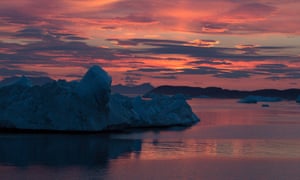| The Guardian | - |
The danger is not as exciting as being engulfed by a 50 foot wave or a gigantic tornado; it is an increase in the civil strife and sectarian warfare that is already mostly swept under the carpet in the global media.
Melting glacier? Yawn. Climate change is boring, worthy – and terrifying
It’s easy to switch off when you hear another report of rising sea
levels. But unless individuals act, we’re heading for a global
catastrophe

It’s
the existential threat to our species, and it bores us to tears. Admit
it. You think the consequences of human-driven climate change are
terrifying, but it seems too abstract, too technical and too long term. A
recent poll in the US
found that, while most Americans accepted that the climate was indeed
changing, less than a quarter admitted to be either extremely or very
worried about it.
So the latest scientific reports should have the effect of grabbing us by the lapels and admonishing us for not taking it seriously enough. A whopping big glacier in Greenland is disintegrating, and fast. Incredibly, 4.5bn tonnes of ice is being lost from this glacier every single year. If it were to disappear, it alone could raise the Earth’s sea levels by half a metre.
Still, my fear is we will occasionally glance at these stories, grimace a bit, and then move on to the latest snaps of Kate Middleton. Perhaps a more effective tool is a website that looks at how major cities will look after rising temperatures have done their thing. Spoiler: who fancies a swim outside the New York Stock Exchange?
The truth is climate change has already given us ever more extreme weather, including intense heatwaves and rain storms. New research suggests that such heatwaves could render much of the Gulf uninhabitable without drastic measures. The singer Charlotte Church was mocked when, on Question Time earlier this year, she suggested that climate change had fuelled the Syrian war. But that is indeed what scientists themselves suggest could have happened, a huge drought having driven rural workers into Syrian cities. This week, the US secretary of state, John Kerry, also suggested that climate change could have helped fuel conflict in both Syria and Nigeria.
Climate change is real, but for many of us it remains a subject to be dropped into “worthy but dull, can someone else sort it out” box. That’s why linking it to issues that relate to people’s everyday lives is so important. Germany has led the way with industrial activism to promote renewable energy industries that provide skilled jobs. Insulating homes and businesses will also create jobs and tackle fuel poverty, as well as tackling climate change. Jobs, growth and living standards: this is surely what climate change has to be linked to if it is to become a compelling issue.
Sure, huge damage has already been done, and glaciers will continue to melt. But radical global measures can help mitigate the damage. A failure to act will mean catastrophe. A single glacier losing 4.5bn tonnes of ice a year. That shook me up, and it should shake you up, too.
So the latest scientific reports should have the effect of grabbing us by the lapels and admonishing us for not taking it seriously enough. A whopping big glacier in Greenland is disintegrating, and fast. Incredibly, 4.5bn tonnes of ice is being lost from this glacier every single year. If it were to disappear, it alone could raise the Earth’s sea levels by half a metre.
Still, my fear is we will occasionally glance at these stories, grimace a bit, and then move on to the latest snaps of Kate Middleton. Perhaps a more effective tool is a website that looks at how major cities will look after rising temperatures have done their thing. Spoiler: who fancies a swim outside the New York Stock Exchange?
The truth is climate change has already given us ever more extreme weather, including intense heatwaves and rain storms. New research suggests that such heatwaves could render much of the Gulf uninhabitable without drastic measures. The singer Charlotte Church was mocked when, on Question Time earlier this year, she suggested that climate change had fuelled the Syrian war. But that is indeed what scientists themselves suggest could have happened, a huge drought having driven rural workers into Syrian cities. This week, the US secretary of state, John Kerry, also suggested that climate change could have helped fuel conflict in both Syria and Nigeria.
Climate change is real, but for many of us it remains a subject to be dropped into “worthy but dull, can someone else sort it out” box. That’s why linking it to issues that relate to people’s everyday lives is so important. Germany has led the way with industrial activism to promote renewable energy industries that provide skilled jobs. Insulating homes and businesses will also create jobs and tackle fuel poverty, as well as tackling climate change. Jobs, growth and living standards: this is surely what climate change has to be linked to if it is to become a compelling issue.
Sure, huge damage has already been done, and glaciers will continue to melt. But radical global measures can help mitigate the damage. A failure to act will mean catastrophe. A single glacier losing 4.5bn tonnes of ice a year. That shook me up, and it should shake you up, too.

No comments:
Post a Comment